Related Research Articles

Arthur Joseph Griffith was an Irish writer, newspaper editor and politician who founded the political party Sinn Féin. He led the Irish delegation at the negotiations that produced the 1921 Anglo-Irish Treaty, and served as the president of Dáil Éireann from January 1922 until his death later in August.
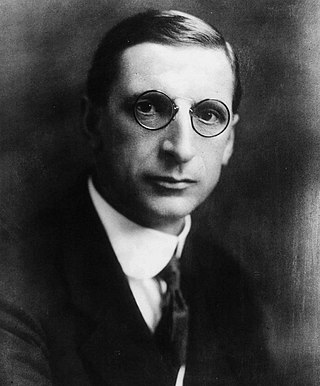
The Irish component of the 1918 United Kingdom general election took place on 14 December 1918. It was the final United Kingdom general election to be held throughout Ireland, as the next election would happen following Irish independence. It is a key moment in modern Irish history, seeing the overwhelming defeat of the moderate nationalist Irish Parliamentary Party (IPP), which had dominated the Irish political landscape since the 1880s, and a landslide victory for the radical Sinn Féin party. Sinn Féin had never previously stood in a general election, but had won six seats in by-elections in 1917–1918. The party had vowed in its manifesto to establish an independent Irish Republic. In Ulster, however, the Unionist Party was the most successful party.

Michelle Angela Gildernew is an Irish Sinn Féin politician from County Tyrone, Northern Ireland. She was the Member of Parliament (MP) for Fermanagh and South Tyrone from 2017 to 2024, after previously holding the seat from 2001 to 2015.
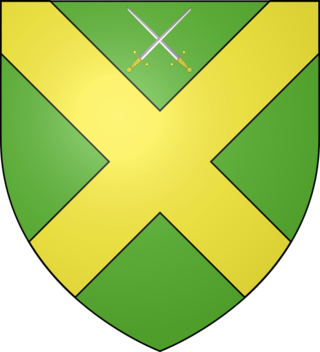
O'Dowd is an Irish Gaelic clan based most prominently in what is today County Mayo and County Sligo. The clan name originated in the 9th century as a derivative of its founder Dubda mac Connmhach. The O'Dowd clan can be traced to the Doonfeeney area of what is now the parish of Ballycastle in Co. Mayo. A large earthen ring fortificatiation still exists called 'Rath O'Dubhda". The nearby early ecclesiastical site at Doonfeeney was more than likely developed under the patronage of the O'Dowds. They descend in the paternal line from the Connachta's Uí Fiachrach. The immediate progenitors of the O'Dowd were Kings of Connacht during the 7th and 8th centuries in the form of Dúnchad Muirisci, Indrechtach mac Dúnchado, Ailill Medraige mac Indrechtaig and Donn Cothaid mac Cathail, before losing ground to their rivals the Uí Briúin.
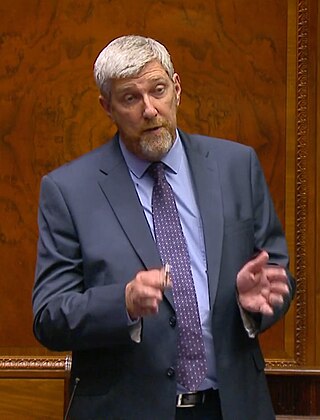
John Fitzgerald O'Dowd is an Irish Sinn Féin politician. He has been a Member of the Northern Ireland Assembly for Upper Bann since 2003. He has served as Minister for Infrastructure from May to October 2022, and again since 2024. He served as Minister for Education in the Stormont Executive from 2011 to 2016. He briefly took on the duties of deputy First Minister in 2011 while Martin McGuinness ran in the 2011 Irish presidential election.

James Nicholas Dolan was an Irish politician and TD for County Leitrim constituencies from 1918 to 1937.
Seán Redmond Etchingham was an Irish Sinn Féin politician.

Donegal is a parliamentary constituency which has been represented in Dáil Éireann, the lower house of the Irish parliament or Oireachtas, since the 2016 general election. The constituency elects five deputies on the system of proportional representation by means of the single transferable vote (PR-STV).
John Joseph Clancy was an Irish politician and Sinn Féin Teachta Dála (TD) of the First Dáil for Sligo North from 1918 to 1921.
Thomas Scanlan was an Irish barrister and nationalist politician. He was Member of Parliament (MP) for North Sligo from 1909 to 1918, as a member of the Irish Parliamentary Party in the House of Commons of the United Kingdom.

Seán MacManus is an Irish Sinn Féin politician, and was the national chairperson of the party from 1984 to 1990.

Alexander McCabe was an Irish Sinn Féin politician.
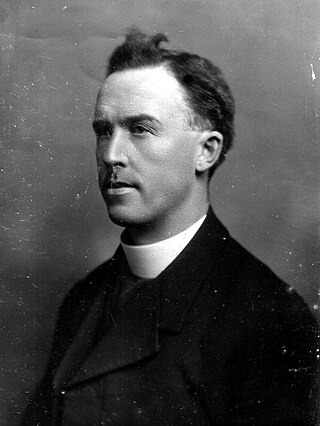
Michael O'Flanagan was a Roman Catholic priest, Irish language scholar, inventor and historian. He was a popular, socialist Irish republican; "a vice-president of the Irish Agricultural Organisation Society, he was a proponent of land redistribution." He was Gaelic League envoy to the United States from 1910 to 1912, and he supported the striking dockers in Sligo in 1913.

Brian O'Higgins, also known as Brian na Banban, was an Irish writer, poet, soldier and politician who was a founding member of Sinn Féin and served as President of the organisation from 1931 to 1933. He was a leading figure within 20th century Irish republicanism and was widely regarded for his literary abilities.
William Frederick Sears was an Irish Sinn Féin and later Cumann na nGaedheal politician.
Matthew Keating was an Irish politician. He was born at Mountain Ash, South Wales, the second son of Cornelius Keating, a native of Cahirciveen, County Kerry. He was educated at the local Catholic Elementary School and became a miner at Nixon's Navigation Colliery. He later entered into business at Cardiff, and at Newport. He relocated to London in 1898.
William O'Malley was an Irish journalist, sportsman, and politician. He was the Member of Parliament (MP) for Galway Connemara from 1895 to 1918.
John Francis O'Beirne was a farmer, businessman, Irish republican activist and Fianna Fáil politician in County Sligo. He served in Seanad Éireann from 1943 to 1944.
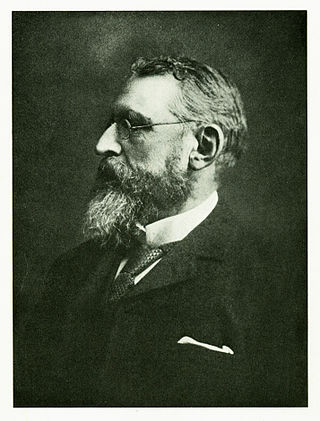
The Cork Free Press was a nationalist newspaper in Ireland, which circulated primarily in the Munster region surrounding its base in Cork, and was the newspaper of the dissident All-for-Ireland League party (1909–1918). Published daily from June 1910 until 1915, and weekly in 1915–16, it was the third of three newspapers founded and published within a decade by William O'Brien MP. It developed a unique approach to the national question and to the social issues of the day, with a pronounced conciliatory view to achieving Home Rule for the whole of Ireland. It displayed a favourable attitude towards the Sinn Féin movement. Its main rival newspapers were the Cork Examiner and the Freeman's Journal.

Chris MacManus is an Irish politician who served as a Member of the European Parliament (MEP) from Ireland for the Midlands–North-West constituency from March 2020 to July 2024. He is a member of Sinn Féin, part of The Left in the European Parliament – GUE/NGL.
References
- Farry, Michael (1992). Sligo, 1914-1921; A Chronicle of Conflict. Trim, Co. Meath.
{{cite book}}: CS1 maint: location missing publisher (link) - "Irish Independent". 27 October 1937.
- Maume, Patrick (1999). The Long Gestation: Irish Nationalist Life 1891-1918. New York.
{{cite book}}: CS1 maint: location missing publisher (link) - James McConnel (2004) ‘ "Fenians at Westminster": The Edwardian Irish Parliamentary Party and the Legacy of the New Departure’, Irish Historical Studies, Vol. 34, No. 133, May, p. 44
- McDowell, R. B. (1970). The Irish Convention 1917-18 . London. ISBN 9780710065117.
{{cite book}}: CS1 maint: location missing publisher (link) - Brian M. Walker, ed. (1978). Parliamentary Election Results in Ireland, 1801-1922. Dublin: Royal Irish Academy.